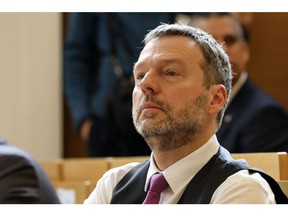
Article content
(Bloomberg) — European Central Bank Governing Council member Pierre Wunsch said the euro-zone economy may need interest rates at “mildly supportive” levels to ensure inflation doesn’t fall below target after a series of shocks.
THIS CONTENT IS RESERVED FOR SUBSCRIBERS ONLY
Subscribe now to read the latest news in your city and across Canada.
- Exclusive articles from Barbara Shecter, Joe O'Connor, Gabriel Friedman, and others.
- Daily content from Financial Times, the world's leading global business publication.
- Unlimited online access to read articles from Financial Post, National Post and 15 news sites across Canada with one account.
- National Post ePaper, an electronic replica of the print edition to view on any device, share and comment on.
- Daily puzzles, including the New York Times Crossword.
SUBSCRIBE TO UNLOCK MORE ARTICLES
Subscribe now to read the latest news in your city and across Canada.
- Exclusive articles from Barbara Shecter, Joe O'Connor, Gabriel Friedman and others.
- Daily content from Financial Times, the world's leading global business publication.
- Unlimited online access to read articles from Financial Post, National Post and 15 news sites across Canada with one account.
- National Post ePaper, an electronic replica of the print edition to view on any device, share and comment on.
- Daily puzzles, including the New York Times Crossword.
REGISTER / SIGN IN TO UNLOCK MORE ARTICLES
Create an account or sign in to continue with your reading experience.
- Access articles from across Canada with one account.
- Share your thoughts and join the conversation in the comments.
- Enjoy additional articles per month.
- Get email updates from your favourite authors.
THIS ARTICLE IS FREE TO READ REGISTER TO UNLOCK.
Create an account or sign in to continue with your reading experience.
- Access articles from across Canada with one account
- Share your thoughts and join the conversation in the comments
- Enjoy additional articles per month
- Get email updates from your favourite authors
Sign In or Create an Account
or
Article content
Article content
With US tariffs denting confidence, strengthening the euro and sending energy costs lower, price pressures will probably turn out weaker than previously anticipated, the Belgian central-bank chief said Tuesday in an interview. Market bets for a deposit rate of just below 2% at year-end are therefore “reasonable,” he said.
Article content
Article content
“You may want to support the economy a little bit to avoid that after two years of low growth, animal spirits would just be pulled down and the recovery would be questioned,” Wunsch said in Frankfurt. “This isn’t about supporting the economy for supporting the economy, but for re-anchoring inflation at 2% and to avoid deflation. We may need to create some confidence, to play it safe.”
Article content
By signing up you consent to receive the above newsletter from Postmedia Network Inc.
Article content
The comments will feed expectations for another rate cut in June following the seven reductions so far this cycle. Most officials have signaled they’re open to another move, but offer few signals beyond that.
Article content
Wunsch said two more quarter-point decreases to 1.75% — the scenario currently priced by markets and predicted by economists — would already mean policy becomes “mildly supportive.”
Article content
The region’s outlook hinges on how US trade policy evolves. President Donald Trump has temporarily lowered the tariffs that were announced on April 2 to allow for talks with trading partners including the European Union.
Article content
To capture the possible outcomes, the ECB will publish alternative scenarios alongside its quarterly projections next month, Chief Economist Philip Lane said Friday. It’s previously used this method during the pandemic and when Russia attacked Ukraine.
Article content
Article content
Wunsch said the tariff hit to euro-area output would probably amount to 25-30 basis points, adding that he didn’t see anything pointing to recession at the moment.
Article content
Some help is on the way from European governments who’re preparing plans to raise military spending. Germany has also committed €500 billion ($562 billion) to modernize infrastructure.
Article content
That’s brightened the region’s prospects further down the line and added to expectations that after more cuts, rates will be hiked again as soon as next year. Wunsch agreed that this was more realistic than keeping borrowing costs at current levels for an extended period in anticipation of stronger inflation in the future.
Article content
“In a perfect world, you could say let’s average that and don’t move again now because it wouldn’t make much of a difference,” he said. “But we’re not living in such a perfect world, this is not how the real economy works.”
Article content
Some officials have argued that the ECB shouldn’t overlook the impact that the rolloff of its balance sheet is having on financial markets. Executive Board member Piero Cipollone said this year that rates should “compensate” for the tightening effect coming from quantitative tightening.
Article content
But Wunsch dismissed the idea of tinkering with the current policy, under which maturing securities from the ECB’s portfolio simply aren’t reinvested. That’s also because halting QT would raise the bar for ever resorting to bond purchases again.
Article content
“If you were to stop QT now, the impact on the market would be very limited,” he said. “But you would reinforce the point that QE will never be symmetric. It’s already going to take years for our balance sheet to return to reasonable levels.”
Article content

.jpg) 5 hours ago
1
5 hours ago
1
 English (US)
English (US)